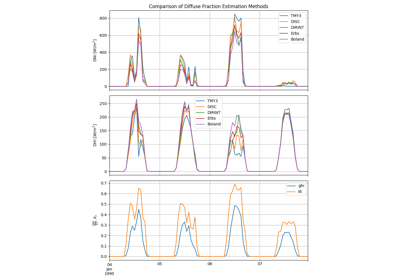pvlib.irradiance.complete_irradiance#
- pvlib.irradiance.complete_irradiance(solar_zenith, ghi=None, dhi=None, dni=None, dni_clear=None)[source]#
Use the component sum equations to calculate the missing series, using the other available time series. One of the three parameters (ghi, dhi, dni) is passed as None, and the other associated series passed are used to calculate the missing series value.
The “component sum” or “closure” equation relates the three primary irradiance components as follows:
\[GHI = DHI + DNI \cos(\theta_z)\]- Parameters:
solar_zenith (series) – Solar zenith angle, with datetime index. Must have the same datetime index as
ghi,dhi, anddni, when available. See solar_zenith. [°]ghi (Series, optional) – Pandas series of dni data [Wm⁻²], with datetime index. Must have the same datetime index as
dni,dhi, andzenith, when available. See ghi. [Wm⁻²]dhi (Series, optional) – Diffuse horizontal irradiance, with datetime index. Must have the same datetime index as
ghi,dhi, andsolar_zenith, when available. See dhi. [Wm⁻²]dni (Series, optional) – Pandas series of dni data [Wm⁻²], with datetime index. Must have the same datetime index as
ghi,dhi, andzenith, when available. See dni. [Wm⁻²]dni_clear (Series, optional) – Pandas series of clearsky dni data [Wm⁻²]. Must have the same datetime index as ghi, dhi, dni, and zenith series, when available. See
dni()for details. [Wm⁻²]
- Returns:
component_sum_df (Dataframe) – Pandas series of ‘ghi’, ‘dhi’, and ‘dni’ columns with datetime index

